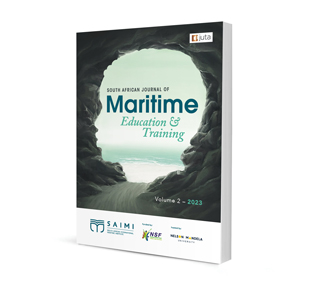
Maritime education and training – responding to the changing role of the seafarer
Author: Tebogo A Mojafi
ISSN: 2790-783X
Affiliations: South African Maritime Safety Authority
Source: South African Journal of Maritime Education and Training, Volume 2 Issue 1, p. 97-120
https://doi.org/10.47348/SAJMET/2023/i1a7
Abstract
Maritime transport carries more than two-thirds of the world’s total cargo and plays an important role in the sustainable development of the global economy. As a derivate of trade, the shipping industry allows citizens of the world to trade and people to gain meaningful employment. According to the 2021 BIMCO ICS Seafarer Workforce Report, there are about 74 000 vessels in the world merchant fleet, employing a total of 1.9 million seafarers (UNCTAD, 2021; Tang and Zhang, 2021). Abidin and Ismail sum the relationship between seafarer and ships by indicating that seafarers play a critical role in facilitating trade, whereas shipping is a critical element in the promotion of international cooperation. Like other industries, shipping is also impacted by changing developments around the world. The dawn of the fourth industrial revolution (4IR) brings about challenges concerning how the industry ensures that tomorrow’s seafarers have the necessary skills to ensure efficiency of the maritime industry. With the changing technologies, Emad, Enshaei and Ghosh caution against simply focusing on the development of technology and forgetting about getting the seafarers ready for the future maritime landscape. Over time, the role of the seafarer has changed, requiring the shipping industry to devise strategies aimed at developing seafarer skills and competencies. Acomi and Acomi found that maritime and offshore oil and gas graduates lacked some of the expected competencies including soft skills and industry experience. Whereas, the BIMCO Workforce Report6 estimates seafarer shortages, there are still many seafarers who are still battling to find employment. How should the country manage its seafarer development programme to ensure South African seafarer relevance into the future? This paper explores how the maritime industry should respond to the changing role of the seafarer. It establishes the challenges faced by South African seafarers regarding placement and explores the role of education and training in addressing the competitiveness of the seafarers.